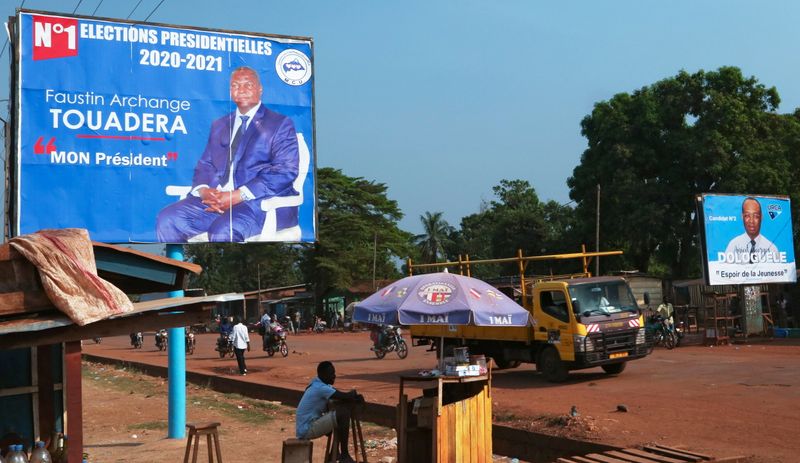By Antoine Rolland
BANGUI (Reuters) -Central African Republic on Sunday voted in presidential and legislative elections being held under a cloud of violence as the government, international partners and United Nations peacekeepers seek to hold off a rebel advance.
Militias hostile to President Faustin-Archange Touadera, who is seeking a second term, have stepped up attacks since the constitutional court this month rejected several candidates, including former President Francois Bozize.
Touadera is considered the favourite in the field of 17 candidates. The election will go to a second round if no candidate receives more than 50% of the vote.
Some polling stations in the capital Bangui opened with a slight delay amid heavy security, following sporadic gunfire heard during the night.
By 0900 GMT, long lines were forming in several polling stations after voting materials were delivered, a Reuters witness said.
But there are concerns that a substantial number of the 1.8 million registered voters in the sparsely populated nation larger than France will not be able to vote in remote towns, some controlled by armed rebels.
Heavy gunfire was reported early on Sunday in the town of Bouar, around 435 km (270 miles) northwest of the capital, a resident said.
"The vote should not only take place in Bangui. I think that the elections should have been postponed. But as it is the law, it is my duty, I am coming to vote for my president," said 31-year old Thierry Yanga who voted in the capital.
The country's constitutional court on Saturday rejected an appeal from several opposition candidates calling for the election to be postponed.
The government and a United Nation's mission in the country had rejected a postponement fearing a power vacuum that could worsen the crisis.
WAVES OF VIOLENCE
The crisis has left many in the diamond- and gold-rich nation of 4.7 million exhausted, while stirring fears of a return to the worst violence of its recent past, which includes five coups and numerous rebellions since independence from France in 1960.
Touadera was first elected in 2016 following a rebellion three years earlier that ousted Bozize. He has struggled to wrest control of vast swathes of the country from armed militias.
Successive waves of violence since 2013 have killed thousands and forced more than a million from their homes.
Touadera and the United Nations, which has over 12,800 uniformed peacekeepers in CAR, have accused Bozize of being behind the rebel offensive, which briefly seized the country's fourth largest city last week and has led to a wave of desertions from the army.
Bozize's candidacy was rejected because he faces an arrest warrant and U.N. sanctions for allegedly ordering assassinations and torture while president. Bozize has denied those charges.

Touadera's international security partners have responded to the latest violence by sending additional troops and equipment, including 300 Russian military instructors and 300 Rwandan peacekeepers.